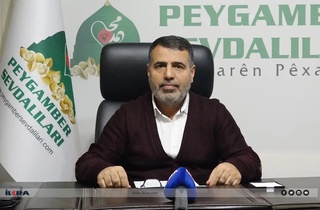In his statement, Çaplık extended congratulations to all Muslims for the beginning of the three months, expressing wishes for goodness and blessings to encompass the Islamic ummah. He hoped that these sacred days would serve as a catalyst for a new awakening and revival within the Islamic world.
Çaplık emphasized the importance of Muslims seizing the opportunity of the three months to engage in prayer and repentance, seeking forgiveness from Allah for their sins. He encouraged individuals to organize their lives with personal and family programs tailored to these spiritually significant months.
Drawing attention to the critical situation in Palestine, Çaplık stressed the need for increased prayers, as well as material and financial aid during the blessed three months. He underscored the importance of maintaining a resolute boycott and expressing solidarity with the Palestinian cause.
"The rewards for worship in the three months are many times more," Çaplık noted, praising Allah for bringing Muslims to this season of mercy once again. He emphasized the significance of turning towards the Divine during this period and escaping from worldly distractions.
Çaplık also highlighted the purification of the heart through remembrance of Allah, suggesting that the polluted heart can find meaning again with various forms of dhikr and vird. He quoted verses encouraging the remembrance of Allah for inner peace.
The statement further outlined the importance of organizing lives with specific programs for the three months, remembering the significance of prayer during Miraj Kandil, cleansing the soul through voluntary fasting, and seeking repentance.
As the month of Sha'ban approaches, Çaplık urged Muslims to pray for these increased worships to become a permanent part of their lives, entering Ramadan armed with taqwa and ihlas. He emphasized the significance of Kadir Night, calling it the sultan of eleven months.
In conclusion, Çaplık reminded Muslims not to forget Palestinian Muslims during the blessed three months, expressing wishes for mercy to the martyrs of Palestine, liberation of Palestine, and Al-Aqsa Mosque. He called for increased aid during this period and continued determination in the boycott against Zionists and their supporters.
The statement concluded with congratulations to Muslims on the commencement of the three months, with hopes for goodness and blessings, and prayers for a new awakening and revival in the Islamic world.
The sacred three months in Islam refer to the consecutive months of Rajab, Sha'ban, and Ramadan, which hold special significance in the Islamic calendar. Each of these months has its own distinctive characteristics and is considered a time for increased devotion, prayer, and reflection among Muslims.
Rajab:
Rajab is the seventh month of the Islamic lunar calendar.
It is often referred to as "Rajab al-Murajab," meaning the honored or sanctified Rajab.
During this month, Muslims engage in increased acts of worship, seeking forgiveness, and making supplications.
The Night of Ascension or "Lailat al-Miraj," commemorating the Prophet Muhammad's (PBUH) journey to the heavens, is believed by many to have occurred in Rajab.
While there are no specific obligatory fasts in Rajab, some individuals choose to observe voluntary fasts as a form of spiritual preparation for the upcoming month of Ramadan.
Sha'ban:
Sha'ban is the eighth month of the Islamic calendar.
It is often referred to as "Shahrul Khayr" (the month of goodness) due to the numerous blessings associated with it.
The middle of Sha'ban, known as the Night of Forgiveness or "Lailat al-Barat," is believed to be a night when Allah determines the destinies of individuals for the upcoming year.
Muslims often engage in additional prayers, charity, and seek forgiveness during this month.
It is also a month when the Prophet Muhammad (PBUH) used to fast most frequently after the month of Ramadan.
Ramadan:
Ramadan is the ninth month of the Islamic calendar.
It is the holiest month for Muslims, marking the period when the Quran was first revealed to Prophet Muhammad (PBUH).
Muslims around the world observe fasting from dawn to sunset during Ramadan, refraining from food, drink, and sinful behavior.
Besides fasting, Muslims engage in increased acts of worship, including additional prayers, recitation of the Quran, and charitable activities.
The last ten nights of Ramadan are considered especially significant, with "Lailat al-Qadr" (the Night of Power) believed to occur during one of these nights. It is a night that surpasses a thousand months in spiritual significance.
The sacred three months provide an opportunity for Muslims to intensify their spiritual journey, seek forgiveness, and draw closer to Allah. The culmination of these months in Ramadan, with its focus on fasting, prayer, and reflection, serves as a pinnacle of spiritual growth and devotion for the Muslim community. (ILKHA)



 Güncel
Güncel
 Dünya
Dünya
 Spor
Spor
 Dünya
Dünya
 Dünya
Dünya
 Dünya
Dünya
 Dünya
Dünya
 Dünya
Dünya
 Dünya
Dünya
 Güncel
Güncel





